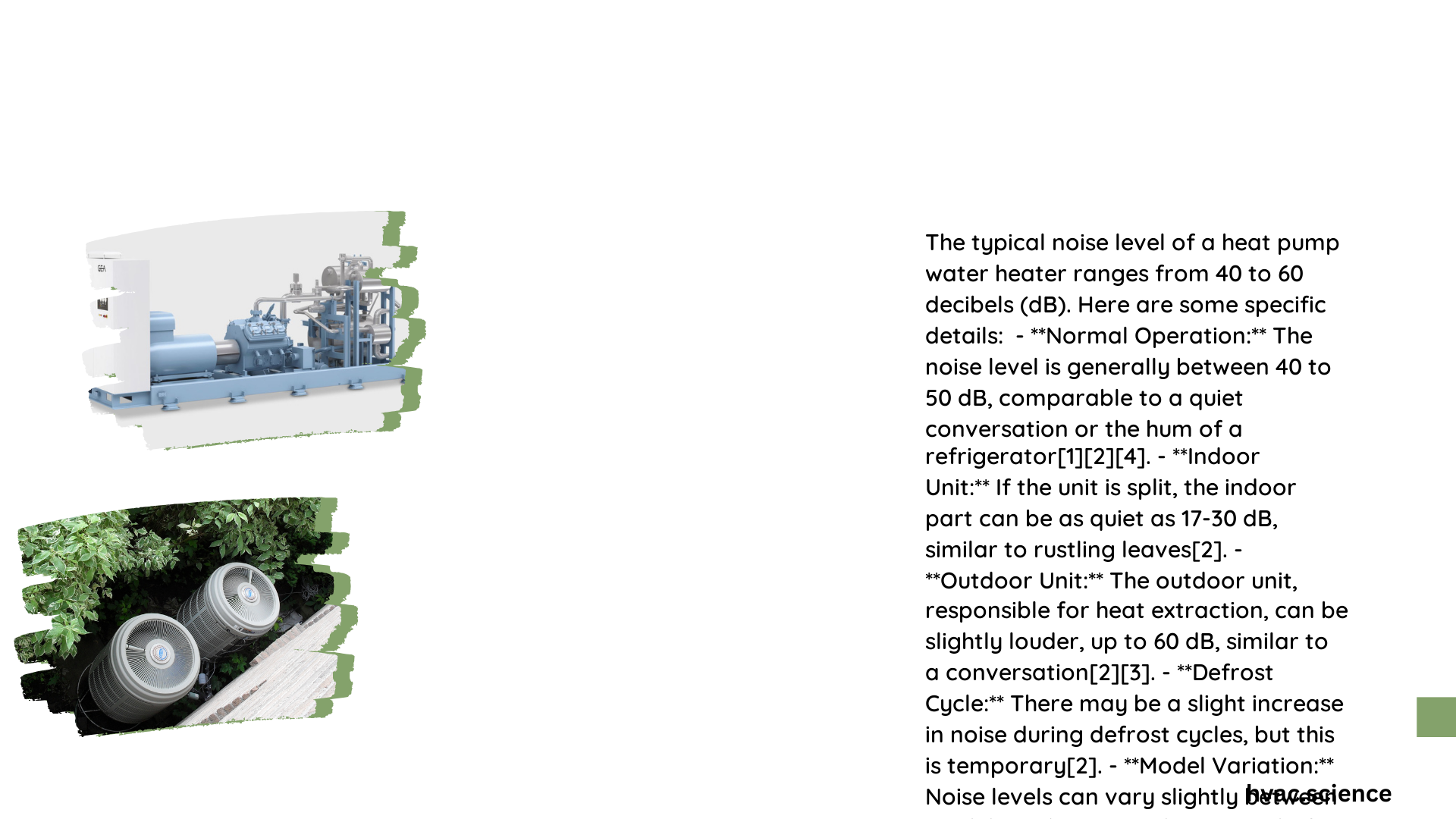Heat pump water heaters represent an innovative home technology that efficiently generates hot water while producing moderate sound levels. Homeowners often wonder about the acoustic impact of these systems, with noise typically ranging between 40-50 decibels during normal operation—comparable to a quiet refrigerator’s hum. Understanding these sound characteristics helps potential buyers make informed decisions about integrating this energy-efficient technology into their living spaces.
What Are the Typical Noise Levels of Heat Pump Water Heaters?
Heat pump water heaters generate sound through various operational components, including compressors, fans, and refrigerant circulation. The noise levels can vary depending on multiple factors:
Decibel Range Breakdown
| Operational Mode | Noise Level (dB) | Comparable Sound |
|---|---|---|
| Normal Operation | 40-50 dB | Refrigerator Hum |
| Indoor Unit | 17-30 dB | Rustling Leaves |
| Outdoor Unit | Around 60 dB | Normal Conversation |
| Defrost Cycle | Temporary Increase | Moderate Background Noise |
Why Do Heat Pump Water Heaters Produce Sound?
The noise originates from several key mechanisms:
- Compressor Operation
- Refrigerant compression creates mechanical vibrations
- Primary source of system noise
-
Modern designs incorporate sound-dampening technologies
-
Fan Movement
- Circulates air for heat exchange
- Contributes to overall acoustic profile
-
Variable speed fans can reduce noise levels
-
Refrigerant Flow
- Liquid and gas movement through system components
- Creates subtle background sounds
How Can You Minimize Heat Pump Water Heater Noise?

Homeowners can implement several strategies to reduce potential sound disruption:
Strategic Installation Techniques
- Location Selection
- Install in garages, basements, or utility rooms
- Minimize proximity to living spaces
-
Use acoustic barriers or insulation
-
Mounting Considerations
- Use vibration-absorbing mounting platforms
- Ensure level installation
- Check manufacturer’s recommended placement guidelines
Advanced Noise Reduction Methods
- Implement acoustic isolation techniques
- Use weatherstripping around installation areas
- Consider split-system configurations with external compressors
- Install ductwork silencers for improved sound management
What Influences Heat Pump Water Heater Sound Levels?
Multiple factors impact the acoustic performance:
- Model Design
- Manufacturer engineering
- Compressor technology
-
Materials used in construction
-
Environmental Conditions
- Ambient temperature
- Humidity levels
-
Installation environment
-
Maintenance State
- Regular servicing
- Component wear
- Lubrication of moving parts
Comparative Noise Analysis
Heat Pump vs. Traditional Water Heaters
| Water Heater Type | Average Noise Level | Characteristics |
|---|---|---|
| Heat Pump | 40-50 dB | Consistent hum |
| Gas Water Heater | Varies | Occasional popping |
| Electric Resistance | Lower | Minimal operational sound |
Expert Recommendations
- Choose models with lower decibel ratings
- Prioritize professional installation
- Conduct periodic maintenance
- Consider acoustic performance during selection process
Real-World User Experiences
Most users report that heat pump water heater noise:
– Is not significantly disruptive
– Becomes background white noise quickly
– Varies minimally during different operational modes
Technical Insights
Modern heat pump water heaters leverage advanced sound-dampening technologies, including:
– Improved compressor designs
– Vibration-absorbing materials
– Precision-engineered components
Final Considerations
While noise remains a consideration, the energy efficiency and long-term cost savings of heat pump water heaters often outweigh minor acoustic concerns.
